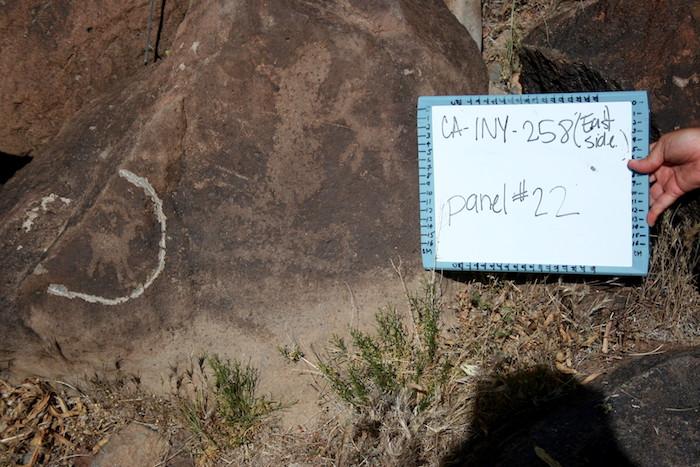Last updated: January 15, 2025
Lesson Plan
Protecting Our Archeological Past

Students play an important role in the protection of archeological resources, such as this damaged petroglyph.
NPS photo.
- Grade Level:
- Upper Elementary: Third Grade through Fifth Grade
- Subject:
- Science,Social Studies
- Lesson Duration:
- 60 Minutes
Essential Question
How can we protect our archeological heritage?
Objective
Students will: 1) Learn that laws and ethics protect our archeological heritage and 2) Understand that all of us are responsible for helping protect the history around us.
Background
This lesson plan is one in a series that uses archeology to teach concepts everyone needs to know. It can be used as-is, or be customized with images, objects, or stories representative of a particular park or place. Llesson plans in this series are:
- What Is (and Isn’t) Archeology?
- Inference vs. Observation in Archeology
- Primary vs. Secondary Sources in Archeology
- Stratigraphy and Superposition in Archeology
- Coordinates and Gridding in Archeology
- Attributes and Classification in Archeology
- Protecting Our Archeological Past
Preparation
Print out one or more news releases or newspaper articles about looting and vandalism of archeological sites in national parks:
- Looters Steal Civil War History at Petersburg National Battlefield (National Park Service)
- Looting at Lewis and Clark National Historical Park opens window into 'mud larkers' (The Astorian)
- Thefts force Joshua Tree National Park closures (Desert Sun)
- A treasure hunter is accused of damaging a cemetery in Yellowstone National Park while searching for hidden treasure (CNN)
- Two people convicted of Archaeological Resources Protection Act violations in Ozark National Scenic Riverways (National Park Service)
Print one copy of the file "ARPA Basics" and enough copies of the file "Dilemma Cards" for a small group activity.
Materials
Lesson Hook/Preview
Lay out this scenario and question for students: "You are visiting a museum. From across the exhibit, you see another visitor pick up an object on display. The visitor then puts the object in their bag. What would you do?" Have them talk for 2 minutes to their neighbor about what they would do.
Come back together as a class to discuss what they would do, which might include: do nothing, tell a parent or another adult (like a museum security guard), confront the thief, etc. Lead a brief discussion: Why is taking from the museum right or wrong? Why? Who is hurt by it? What might happen to the person who took the object if they were caught? Is it right or wrong to punish the person for taking the object?
(Note: Ensure that students understand that, for children or young people, the best and safest option may not be confronting a stranger themselves. If they think someone has done something wrong, they should bring it to the attention of an adult they know.)
Procedure
1. Share ARPA background information.
Explain to students that, in the United States, it is wrong to loot or vandalize archeological sites and remove artifacts. It is not only illegal, but inethical. Tell them that even though there are laws that protect sites, there are still people who destroy them.
Share information from the "ARPA Basics" brief. Ask the students to recap the facts, including the purpose of the law and the penalties. Check in -- ask if they have ever visited any parks or lands listed in the brief.
2. Examine news articles.
Pass out the articles about looting and vandalism in national parks. Ask the students: What are the facts of the case? What does the article say about how people feel about the crime?
3. Complete the Dilemma Cards.
Put students in small groups of 3-4 people. Give give each group a set of Dilemma Cards. Say that a dilemma is another word for "problem," and these cards have dilemmas or problems about the looting or vandalization of archeological sites. Direct the groups to read the card and decide which of the solutions is best, and why, starting with Dilemma Card #1.
After each group has a chance to work through the cards, ask each group to report out on one dilemma. Open it up to group discussion: do the other students agree? Is it the right legal choice? Is it the right ethical choice?
Vocabulary
Archeology: The study of the past based on the material evidence that people left behind
Artifact: An object made or used by humans
Dilemma: A choice that needs to be made, but that might be difficult
Ethics: Knowing the difference between right and wrong
Law: A bill passed by a federal or state legislature that identifies activities that are allowed or not allowed
Assessment Materials
Use the assessment for students to explore how they can help protect archeological sites. Have students choose a creative way to express their new knowledge about protecting archeological sites, such as a picture or a short story or play. They should incorporate definitions of law and ethics, information about ARPA, and a dilemma to be solved.
